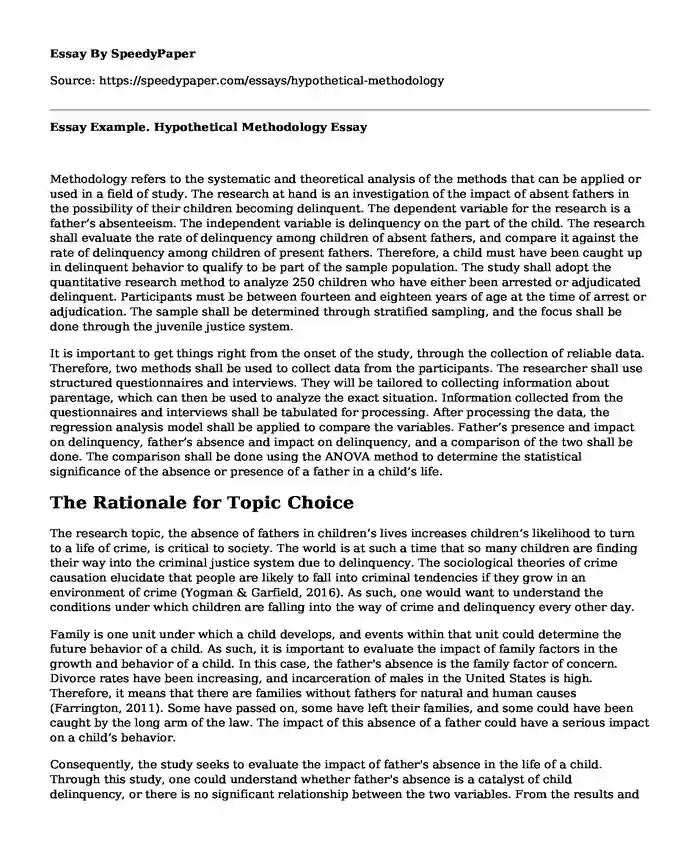
| Type of paper: | Essay |
| Categories: | Parenting Child development Criminal justice Juvenile justice |
| Pages: | 3 |
| Wordcount: | 654 words |
Methodology refers to the systematic and theoretical analysis of the methods that can be applied or used in a field of study. The research at hand is an investigation of the impact of absent fathers in the possibility of their children becoming delinquent. The dependent variable for the research is a father’s absenteeism. The independent variable is delinquency on the part of the child. The research shall evaluate the rate of delinquency among children of absent fathers, and compare it against the rate of delinquency among children of present fathers. Therefore, a child must have been caught up in delinquent behavior to qualify to be part of the sample population. The study shall adopt the quantitative research method to analyze 250 children who have either been arrested or adjudicated delinquent. Participants must be between fourteen and eighteen years of age at the time of arrest or adjudication. The sample shall be determined through stratified sampling, and the focus shall be done through the juvenile justice system.
It is important to get things right from the onset of the study, through the collection of reliable data. Therefore, two methods shall be used to collect data from the participants. The researcher shall use structured questionnaires and interviews. They will be tailored to collecting information about parentage, which can then be used to analyze the exact situation. Information collected from the questionnaires and interviews shall be tabulated for processing. After processing the data, the regression analysis model shall be applied to compare the variables. Father’s presence and impact on delinquency, father’s absence and impact on delinquency, and a comparison of the two shall be done. The comparison shall be done using the ANOVA method to determine the statistical significance of the absence or presence of a father in a child’s life.
The Rationale for Topic Choice
The research topic, the absence of fathers in children’s lives increases children’s likelihood to turn to a life of crime, is critical to society. The world is at such a time that so many children are finding their way into the criminal justice system due to delinquency. The sociological theories of crime causation elucidate that people are likely to fall into criminal tendencies if they grow in an environment of crime (Yogman & Garfield, 2016). As such, one would want to understand the conditions under which children are falling into the way of crime and delinquency every other day.
Family is one unit under which a child develops, and events within that unit could determine the future behavior of a child. As such, it is important to evaluate the impact of family factors in the growth and behavior of a child. In this case, the father's absence is the family factor of concern. Divorce rates have been increasing, and incarceration of males in the United States is high. Therefore, it means that there are families without fathers for natural and human causes (Farrington, 2011). Some have passed on, some have left their families, and some could have been caught by the long arm of the law. The impact of this absence of a father could have a serious impact on a child’s behavior.
Consequently, the study seeks to evaluate the impact of father's absence in the life of a child. Through this study, one could understand whether father's absence is a catalyst of child delinquency, or there is no significant relationship between the two variables. From the results and recommendations of the study, those involved in the child delinquency system can focus on better mitigation measures against the vice. It is also a good platform upon which to base parentage going into the future.
References
Farrington, D. (2011). Crime and Family. In J. Wilson & J. Petersilia, Crime and Public Policy. Oxford University Press. Retrieved 27 July 2020, from https://books.google.co.ke/books?hl=en&lr=&id=C3Gi1ob0W4oC&oi=fnd&pg=PA130&dq=role+of+fathers+in+preventing+child+delinquency&ots=oVNvCCgm19&sig=dLUXtHt-NrNc9NjFmvzzZFsd_HA&redir_esc=y#v=onepage&q=role%20of%20fathers%20in%20preventing%20child%20delinquency&f=false.
Yogman, M., & Garfield, C. (2016). Fathers Roles in the Care and Development of Their Children: The Role of Pediatricians. PEDIATRICS, 138(1), e20161128-e20161128. https://doi.org/10.1542/peds.2016-1128
Cite this page
Essay Example. Hypothetical Methodology. (2023, Oct 31). Retrieved from https://speedypaper.com/essays/hypothetical-methodology
Request Removal
If you are the original author of this essay and no longer wish to have it published on the SpeedyPaper website, please click below to request its removal:
- Essay Sample on Childhood Diseases: Whooping Cough
- Free Essay on Ways in which Television Distorts Children's Perception of Reality
- Case Study: Steinke Vs. Zarate, Free Essay about Criminal Injustices
- Paper Example. Practical Research on Mobile-Assisted Language Teaching in China Universities
- Essay Sample on Law Enforcement - The Court System
- Essay Sample on Sociological Imagination and Protests
- Free Paper Example on Moral Codes
Popular categories




